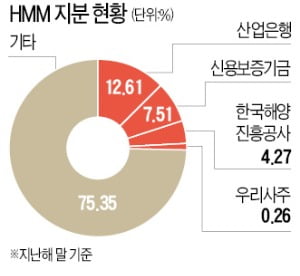The KDB’s early privatization of HMM (formerly Hyundai Merchant Marine) was due to the judgment that the shipping industry was booming after 10 years and that it was the right time for privatization. This is in line with the opinion of Chairman Lee Dong-geol that the competitiveness of the national infrastructure can be enhanced only by privatizing companies that have been incorporated into the KDB system. It is analyzed that Chairman Lee threw the number of matches again following Hyundai Heavy Industries’ acquisition of Daewoo Shipbuilding & Marine Engineering and the integration of Korean Air and Asiana Airlines.

HMM privatization is San Eun’s long-standing’homework’. HMM was incorporated into a KDB subsidiary in October 2016 and has undergone intensive restructuring. At the time, HMM’s management situation was so bad that it could rush right before bankruptcy. Since 2016, over 3 trillion won has been invested in public funds, but the performance has not improved. Following a deficit of 8333 billion won in 2016, it recorded a total operating loss of 2,982 trillion won by 2019. In early 2018, KDB proposed to acquire HMM to some conglomerates such as POSCO, but it was immediately rejected because there were great doubts about HMM’s capabilities as a continuing company.
Saneun pressed HMM more strongly. At a press conference held in November 2018, Chairman Lee said, “There is a widespread’moral hazard (moral hazard)’ in HMM.” The executives of HMM were called to the headquarters in Yeouido, San-eun to report on the business status every week.
Saneun’s high-intensity restructuring took effect last year in the face of a new coronavirus infection (Corona 19). With the booming shipping industry and the efforts of the KDB and the government that ordered large container ships in a timely manner, HMM succeeded in making an operating surplus in 21 quarters of last year.
In the market, HMM is expected to generate an operating profit of 800 billion won last year. This is the reason why the government and the Bank of Korea see the right time for privatization when HMM’s management has been normalized to some extent.
Inside and outside the government, POSCO is cited as the best candidate for HMM’s acquisition. In the market, if POSCO, which has enormous financial power, acquires HMM, it is expected to create synergy in various fields. The cost can be drastically reduced through logistics efficiency immediately. POSCO, the largest steel maker in Korea, ships about 160 million tons of raw materials and products per year. The total annual logistics cost including group affiliates such as POSCO International is estimated to have reached 6 trillion won last year alone, at 10% of total sales.
As of the end of the third quarter of last year, POSCO’s cash and cash equivalents amounted to KRW 6.76 trillion. It can afford the estimated KRW 1.5 trillion to KRW 1.5 trillion in the sale of HMM. Considering that the shipping industry will continue to boom this year, some analysis suggests that it can be acquired at a’fair price’. A government official said, “HMM must increase its fleet and grow a’scale economy’,” and said, “Posco can be a suitable person to continue aggressive investments in the shipping industry.”
Reporter Mansu Choi/Gyeongmin Kang [email protected]
Ⓒ Hankyung.com prohibits unauthorized reproduction and redistribution
